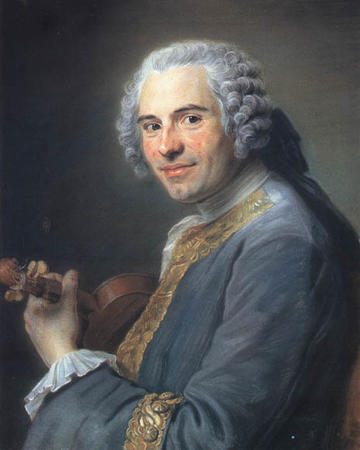
Titon & l'Aurore (Jean-Joseph Cassanéa de Mondonville) by Maurice Quentin de La Tour, c. 1746
Instruments of Time & Truth celebrate the 300th anniversary of the inaugural concerts of the ‘Concert Spirituel’ in 1725
• 12 June Symposium in the Maison Française, Oxford
• 13 June Concert in the Sheldonian Theatre, Oxford
Kindly note that both events are open to the University community as well as the general public.
Tickets for the concert are available for purchase here.
Background
On 18 March 1725, in the Salle des Cent Suisses in the Palais des Tuileries, Anne Danican Philidor presented the first concert in a series known as Le Concert Spirituel. This institution became the leading promoter of public concerts in Paris during the 18th century, continuing to 1790. Its role in defining the genres of concerto and symphony as the mainstays of public repertory is unparalleled. It also provided a permanent platform for the grand motet – psalm-settings on a grand scale.
The name ‘Concert Spirituel’ reflects its role in providing public music on religious feast days, or days of special solemnity, when the opera was shut. The ‘spiritual’ connection was made through the inclusion always of a grand motet. The first concert comprised a performance of two grands motets by Delalande and instrumental music by Corelli. Virtuoso instrumentalists soon became a feature of the programming, the violinist and composer Jean-Marie Leclair being an early example. The history of the concerto owes much to the promotions of the Concert Spirituel. Likewise, the history and development of the symphony, with works by Gossec and Chevalier de St Georges leading the way to performances of symphonies by Mozart and Haydn. Well over 1000 concerts are listed in Constant Pierre’s Histoire du Concert Spirituel (1975).
The 300th anniversary of the inaugural year of the Concert Spirituel is certainly a moment to mark. Instruments of Time & Truth will do that with both a concert of music associated with the Concert Spirituel 13 June), and with a symposium (French and British scholars) on the subject of 18th-century Academies of Music (12 June).
Edward Higginbottom, who is planning and directing this project, has a lifelong interest in French music of the period. He has performed and recorded French repertory from Eustache du Caurroy to Mondonville, in addition to works by Fauré, Duruflé and Poulenc. He has also written extensively on subjects related to the repertory. His contribution to the field has been recognised by the French government with the award Commandeur de l’ordre des arts et des lettres.
- Symposium 12 June 2025, Maison Française, 10:00 – 12:30
Academies of Music in 18th-c France and England: their role in the promotion of public music, and in forming taste, expectation and appetite.
- Concert 13 June 2025, Sheldonian Theatre, 19:30
Instruments of Time & Truth / Oxford Consort of Voices / soloists / student voices / directed by Edward Higginbottom
Programme
• François-Joseph Gossec, Symphony in E flat major, op.12/5 (c.1769) [newly edited from a Bodleian
source by EH]
• Louis-Nicolas Clérambault, Orphée (solo cantate for solo soprano)
•Jean-Joseph Cassanéa de Mondonville, Grand Motet Venite exultemus [ed. EH]
INTERVAL
• Jean-Baptiste Davaux, Simphonie Concertante in C major, op.7/1 (1773) Allegro – Gratioso [newly
edited by EH]
• W. A. Mozart, “Paris” Symphony in D (K 297) (1778) Allegro assai – Andantino – Allegro
Partners
Oxford University Humanities Cultural Programme
Maison Française, Oxford
Oxford Faculty of Music
French Cultural Programme
L’Alliance Française d’Oxford
Centre de Musique Baroque de Versailles
Voltaire Foundation
Sponsors of Instruments of Time & Truth